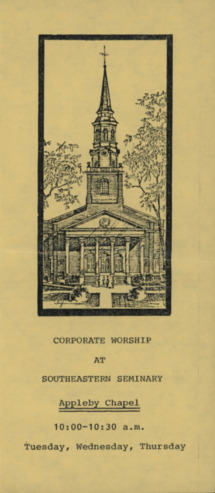Collections de parents (1)
Fonctionne dans cette collection (773)
Sélectionnez une image pour lancer le diaporama

SEBTS Chapel - George W. Braswell, Jr. September 29, 1981
1 de 10

SEBTS Chapel - John Ryberg October 25, 1984
2 de 10

SEBTS Chapel - Donna M. Forrester October 22, 1985
3 de 10

SEBTS Chapel - John Rutter September 11, 1980
4 de 10

SEBTS Chapel - Robert Lee Richardson, Jr. September 17, 1987
5 de 10

SEBTS Chapel - Neal Jones October 17, 1984
6 de 10

SEBTS Chapel - L. D. Johnson November 18, 1980
7 de 10

SEBTS Chapel - Glenn T. Miller July 17, 1980
8 de 10

SEBTS Chapel - William O'Brien April 2, 1985
9 de 10

SEBTS Chapel - James H. Blackmore November 18, 1981
10 de 10